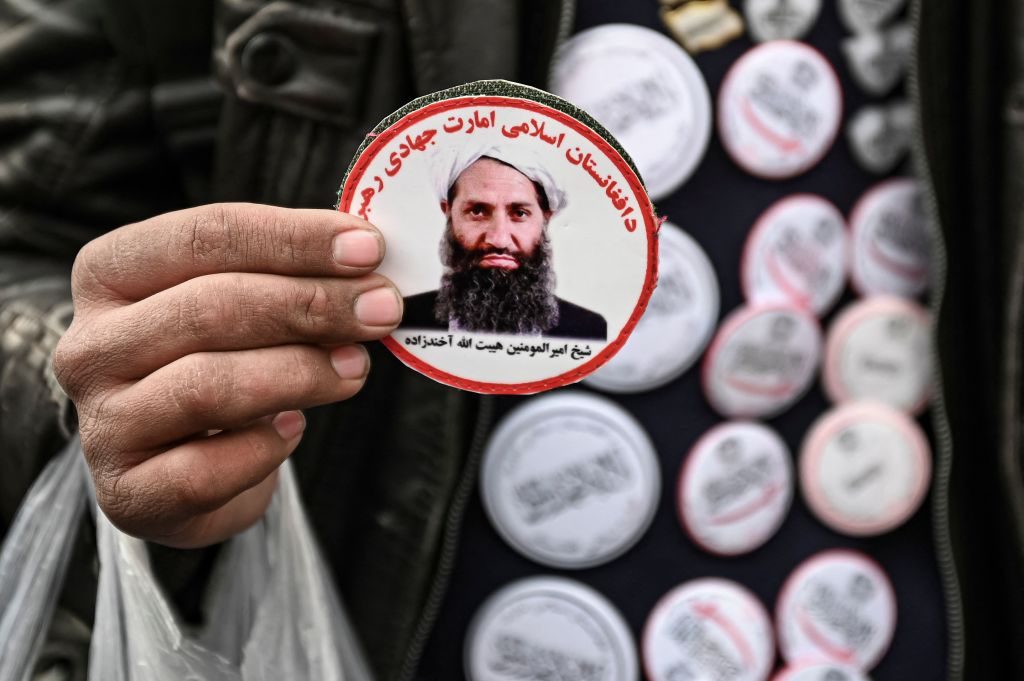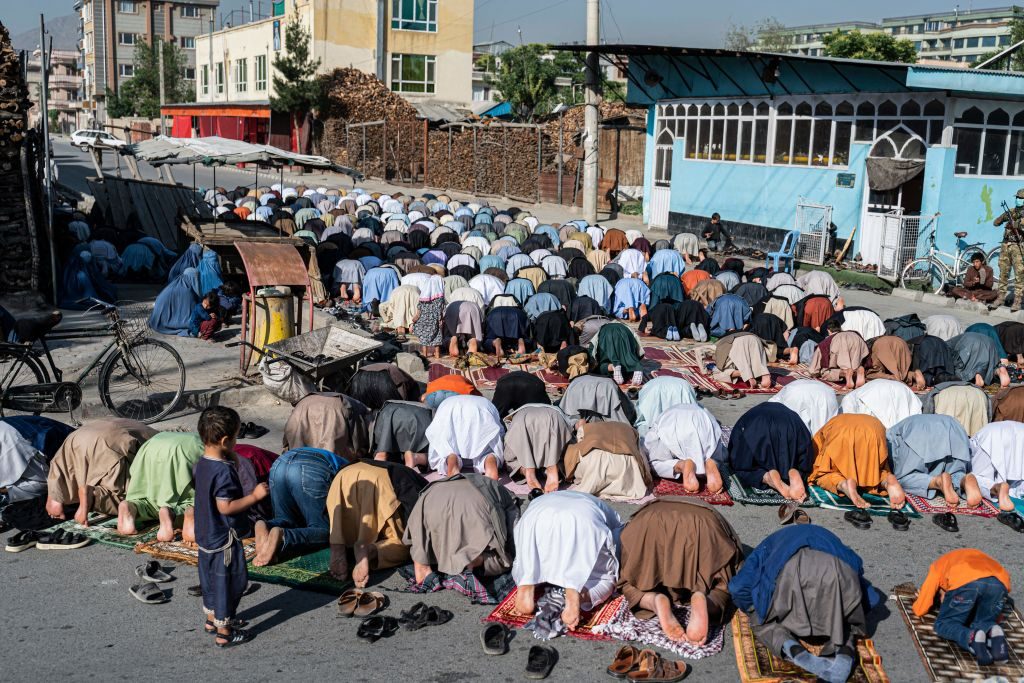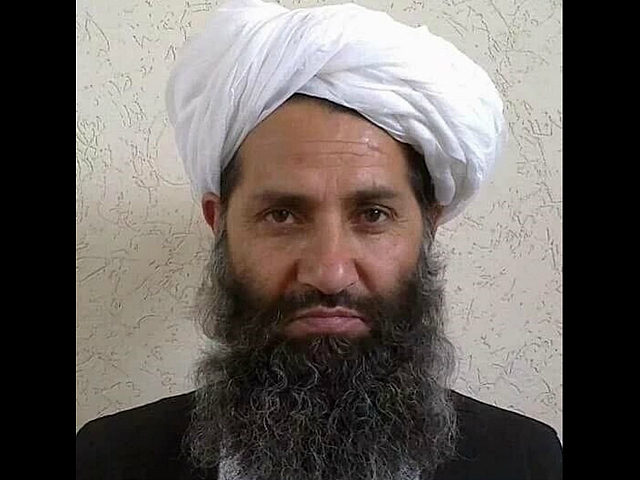Taliban “Supreme Leader” Hibatullah Akhundzada made a public appearance this weekend to celebrate the end of the Muslim holy month of Ramadan, Eid al-Fitr, and offered brief comments crediting the jihadist terrorist group with restoring “security” to Afghanistan.”
In reality, while the Taliban eradicated the internationally recognized government of Afghanistan in August and, by doing so, ended the 20-year-old war with that defunct entity, terrorist attacks on civilians have greatly increased in the past month. The Afghan newspaper Etilaat Roz counted “at least 18 bloody explosions” in the 11 days preceding Akhundzada’s appearance, many of them targeting the ethnic Hazara minority, who are mostly Shiite Muslims. The Taliban is a Sunni jihadist organization.
Akhundzada’s appearance was of particular note because it was his second known public appearance since he became the head of the Taliban six years ago.
“Congratulations on victory, freedom and success … Congratulations on this security and for the Islamic system,” Akhundzada said while attending Eid services on Saturday local time (Sunday in the Western Hemisphere) before a crowd of thousands in Kandahar’s Eidgah mosque, according to Al Jazeera. The Taliban has traditionally enjoyed its most fervent support in the city, the second-largest in Afghanistan.
“Akhunzada delivered his brief address from one of the front rows of worshippers in Kandahar without turning to face the crowd, according to social media posts. Taliban officials did not allow journalists to approach him. Two helicopters hovered over the mosque for the two-hour event,” Al Jazeera observed.
Prior to his public appearance on Eid, senior Taliban spokesman Zabihullah Mujahid shared an extended message from Akhundzada online similarly celebrating the alleged “peaceful and prosperous life” the Taliban had returned to Afghans after running former President Ashraf Ghani out of Kabul in August.

File/A man sells stickers picturing Taliban supreme leader Haibatullah Akhundzada at market in Kabul on December 26, 2021. (MOHD RASFAN/AFP via Getty)
“I am immensely grateful to Almighty Allah that we are celebrating Eid-ul-Fitr this year at a time while our country is completely free of foreign invasion,” the message read in part, according to the English-language translation Mujahid shared on Twitter. “The long lasting and devastating war has finally ended and now under the shade of Islamic rule, the ground has been prepared for a peaceful and prosperous life in Afghanistan.”
“The Jihad, sacrifice, and efforts of all Mujahedeen of the Islamic Emirate [the Taliban] and those who strive for achieving the freedom and independence of the country is commendable and I pray to Allah to reward each individual in this world and in the hereafter,” Akhundzada continued. “May Allah the Almighty, accept the sacrifices, martyrdoms and Jihad of our Mujahedeen in the last two decades, may Allah reward the disabled, refugees, wounded and the prisoners and empower us to look after the widows and orphans.”
Akhundzada also appeared to conclude that violence had entirely stopped occurring since American forces left the country in August.
“Security is the prime condition for development and prosperity, and fortunately, the IEA [Taliban] forces have ensured security with immense sacrifices; now, it is duty of all Afghans to work hard and rebuild their country and serve poor and needy people with integrity and courage,” he claimed.
The rest of his extensive message repeated what have now become boilerplate policy talking points for the terrorist group: inviting Afghans, particularly those with higher education, to return home and enrich the Taliban; urging foreign countries to recognize the Taliban as a legitimate government and engage in “positive relations” with it; and claiming to ban the cultivation of poppy for heroin and other opioid production.
Etilaat Roz, an Afghan newspaper whose journalists have faced physical assaults from Taliban jihadists, observed following Akhundzada’s speech that civilians have faced a growing number of bombings and other acts of terrorism in the past month, particularly ramping up towards the end of Ramadan. On Tuesday, it relayed, Kabul experienced three bombings, two of them targeting schools.

Muslim devotees offer prayers to mark Eid al-Fitr, which marks the end of the holy fasting month of Ramadan, outside a mosque in the middle of a street in Kabul on May 1, 2022. (Wakil KOHSAR / AFP)
“On Thursday … an explosion took place in Khogyani district of Nangarhar province. The blast was caused by a roadside mine and targeted a Taliban ranger. … Shortly afterwards, three explosions erupted in Kabul the same day,” the newspaper observed.
A mosque bombing in Kabul killed over 50 people on Friday following prayers in anticipation of Eid.
“The situation of our people is very sad, especially after what happened in the mosques,” Kabul resident Ahmad Shah Hashemi told the Agence France-Presse (AFP) this weekend. “Many young and old people have been martyred. The people of Afghanistan have nothing but sorrow.”
Follow Frances Martel on Facebook and Twitter.

COMMENTS
Please let us know if you're having issues with commenting.